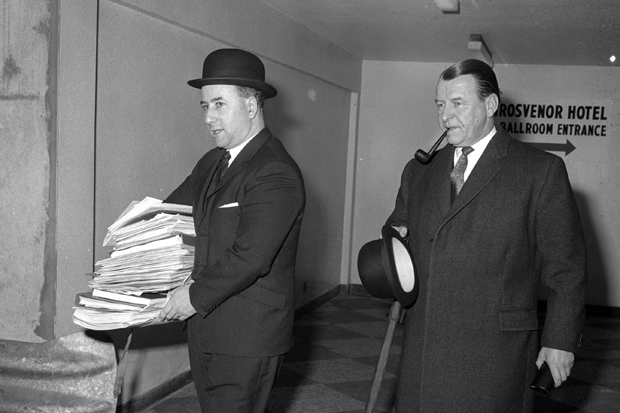This intensely written memoir by Adam Mars-Jones about his Welsh father, Sir William, opens with the death of Sheila, Adam’s mother, of lung cancer in 1998: ‘She died with self-effacing briskness in little more than a month.’ Adam too is self-effacing, moving in while his mother was dying, then staying on as his father’s main carer. The second of three brothers, he explains away this generous act: ‘As an under-employed freelance, I had time to spare.’ ‘Dad’, diagnosed informally as ‘demented’, was by then a retired High Court judge granted a low rent for a large flat in Gray’s Inn. Adam lived in the flat’s converted attic.
Adam is thorough and, it appears, fair. ‘Dad’ is depicted as pompous, playful, flirtatious (dubbing certain women ‘sparklers’), ungracious (rejecting Adam’s carefully chosen Christmas present) and occasionally grateful (to Adam, for looking after him). He can be cruel (to a woman guest at his own farewell party at the Garrick) and homophobic — Adam finally disclosed to him, in the late 1970s, that ‘I belonged to the category he hated and feared’. Mars-Jones senior had disapproved of the 1967 Sexual Offences Act decriminalising homosexuality but in old age, to his son’s surprise — and consternation at the inconsistency — became indignant about discrimination. By then Adam had had two male partners, one, Michael, dying of Aids, aged 26. ‘After that, Dad slowly lost his horror of my sexual identity, though he never got as far as acknowledging a partner of mine.’
Adam has conscientiously researched the court cases his father was involved in, perhaps a few too many. (I preferred the book’s last third, which is more personal.) Mars-Jones senior bewigged emerges as independent-minded: against the death penalty but also against pornography and the permissive society. As Mr Justice Mars-Jones, he presided in 1978 over the ABC trial in which three journalists were tried under the Official Secrets Act. Unpredictably, he dismissed the charges, saying that ‘the Official Secrets Act had never been intended to be used in such a way’ and, when told that the Attorney General had authorised the prosecution, declared: ‘Then he can unauthorise it.’ Adam recounts this admiringly, and tells how his father as a barrister in 1963 took on and won the screenwriter Kevin McClory’s case against Ian Fleming. The former sued Fleming for lifting ideas from his screenplay and using them in the James Bond novel Thunderball. A colleague recalled that for this Mars-Jones was paid £10,000, a huge sum at the time.
But Adam asserts that his father ‘would never have agreed that a barrister is someone who wins arguments for a living’. He had a loftier idea of his profession. Adam concedes that, as the son of a postmaster and farmer from Denbighshire, ‘Dad had forced himself through rock’ to get where he was, and was almost the only judge then not to have been educated privately. ‘Serious about his Welshness’, he still loved the buttermilk of his farm childhood, which Adam would get him from a London supermarket. Though his own father had been a teetotal Methodist, ‘Dad’ had no shame about having to be helped to his flat after many a boozy dinner. He was unable to admit he was wrong about anything, and his self-justifications were so elaborate that his ‘apologies weren’t worth having’.
But, after all, ‘Dad’s egotism was deep, though not cold’. After his death, Adam received a telephone call from a lady his father had once proposed to. Spotting him unexpectedly on a London bus decades later, she had noticed him trembling at the sight of her.
Adam also describes his father’s reaction to Sheila’s death — her rapid decline, in the same flat, had been kept from him at her wish.
He said: ‘Oh God’, but then after a deep intake of breath turned the exclamation into the beginning of a hymn, singing, ‘Our Help in ages past….’ He wept and I held his hand.
Mars-Jones died of pneumonia the year after his wife, surely lucky to have had Adam hold his hand so often.






Comments